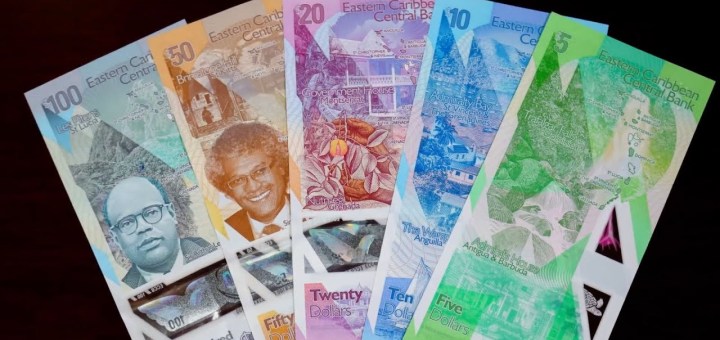The Eastern Caribbean (EC) dollar has remained stable amid regional and global lockdowns prompted by the spread of the coronavirus.
Timothy Antoine, the Governor of the Eastern Caribbean Central Bank (ECCB) said as of April 24, 2020 the EC dollar, which is pegged to the US dollar, “remains very strong”, backed by foreign reserves at 100.3 per cent. The exchange rate with the US remains at $2.7 as at May, 5, 2020.
However, with the global economy now in recession and the revenue of regional governments plummeting by as much as 50 per cent,the governor is encouraging currency residents to adopt some key actions.
In order to reduce the economic impact of the pandemic on the Eastern Caribbean Currency Union (ECCU) he said people must continue to follow health protocols.
“Our health require that we do, and our economies demand that we do. And if we don’t, if we get careless and complacent, we are going to be forced back into lockdowns, back into shutdown and we will impose and will heap upon ourselves more economic difficulty”.
Antoine also stressed on the importance of properly managing finances, expanding connectivity through digital tools and of adopting a growth mindset that will alter the delivery of business services.
“Our working assumption is that this is a marathon, not a sprint,” he noted, as he encouraged people to identify essential from non-essential spending, focusing on needs and not wants.
“We need to use our limited finances wisely. At the personal level, at the household level, at the business level and at the government level – all of us because money is scarce. “
He also encouraged residents to support regional solidarity and to “Feed your faith, not your fears” outlining that social distancing does not mean spiritual distancing.
“Fear has a useful function. It alerts us to danger, real and potential but once we have been alerted, we have to pivot from fear to faith because if we don’t, we are going to be paralyzed by fear” … “Everyday count three blessings … it will help your state of mind”.
Driven by the temporary loss of the tourism sector, the ECCU has predicted a decline in economic output in 2020 of 10 to 20 per cent across the currency union.
“In all likelihood, the economic damage of this pandemic will outlast the pandemic and in the absence of a vaccine, we’re likely to have a protracted recovery process” … “12 to 18 months does not appear to be unreasonable “he said.
There are however positive benefits which are being derived from the pandemic. Apart from paying reduced prices to import oil into the various territories, the pandemic will leave a legacy of stronger health systems that could in turn assist with foreign investment.
According to the governor, because governments have had to invest significantly in health systems, that benefit could enhance the value proposition for people wanting to apply for citizenship.
He said that going forward people need to know that they will be safe and that their health will be looked after.
It is on that basis Antoine believes foreign direct investment, which is likely to affect the amount of revenue raised by countries’ Citizenship by Investment Programmes (CIP), will only see a short-term decline.
A drop in remittances is also predicted he said particularly because of the massive layoffs in the United States. “I’m told, close to 30 million people unemployed, there will be an adverse impact on remittances in our currency union. In fact, we may see a phenomenon we observed after the global financial crisis when we saw reverse remittances that is to say people in our currency union was sending money to people in the United States and the UK. That is a distinct possibility at this time.”

